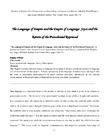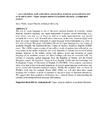Search
Now showing items 1-10 of 99
The Language of Empire and the Empire of Language: Joyce and the Return of the Postcolonial Repressed
(Four Courts Press, 2007)
This chapter examines the importance of language in the imperial project and the importance of language as a deconstruction of that project. It looks specifically at the language of James Joyce and argues that his work ...
‘Both more than a language and no more of a language’: Michael Hartnett and the Politics of Translation.
(Four Courts Press, 2003)
This essay looks at the politics of translation through a specific focus on the poetry, in Irish and in English, of Michael Hartnett. It suggests a politics of translation that is emancipatory and creative, and deconstructs ...
Ireland, Modernity and the Question of Definition
(The Journal of Music in Ireland, 2003)
This essay is an exploration of the notion of modernity, and its relationship with tradition. It is a response to John Waters’ article on modernity entitles ‘Reactionary Progressives’. I will respond to the article in ...
'Blitzophrenia': Brendan Kennelly's post-colonial vision.
(Irish University Review, 2003)
The Philistines as scapegoats: narratives and myths in the invention of ancient Israel and modern critical theory
(Edinburgh University Press, 2004)
The Philistines have, for centuries, suffered under the weight of their relentlessly negative portrayal in the book of the Old Testament.From Goliath to Delilah, they have personified the intrinsically evil other in the ...
'Tore down a la Rimbaud': Brendan Kennelly and the French connection
(Peter Lang, 2007)
A lot done, more to do – Barthes, Bertie and the facteur poujade
(Peter Lang, 2004)
'Is Medea's crime Medea's glory?' Euripides in Dublin.
(Methuen Publishing Ltd, 2002)
Post-colonialism, multi-culturalism, structuralism, feminism, post-modernism and so on so forth’ – vague language in academic discourse, a comparative analysis of form, function and context (Pre-published version)
(John Benjamins, 2008)
The use of vague language is one of the most common features of everyday spoken English. Speakers regularly use vague expressions to project shared knowledge (e.g., pens, books, and that sort of thing) as well as to make ...
Towards a farewell: A brief life
(Four Courts Press, 2006)











